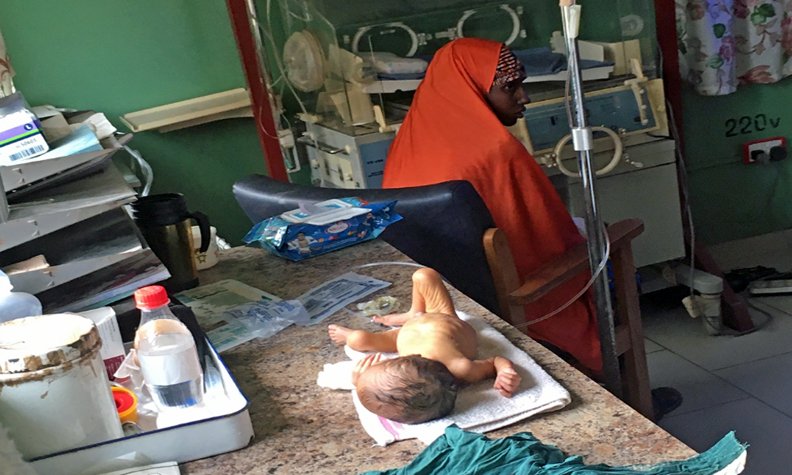
Thomas Froese
An emaciated baby and a mother in a hospital in Egbe, Nigeria.
(The Hamilton Spectator – Saturday, May 11, 2024)
I once read that if you’re a mother then you have no more claim on humanity than anyone else. I think there’s something to it. Otherwise we’d just idealize motherhood or idolize mothers.
I’m also not one of those people who sees a miracle around every corner.
But I believe there are some remarkable things about motherhood. And anyone who has ever witnessed a child’s birth – I have, twice – can’t help but wonder if the entire event is nothing but a disguised miracle, easy to miss because, like the air we breathe, it’s so common. By the time you finish reading this hundreds of newborns will have come screaming into the world.
Yet in any given day, like Mother’s Day, for their efforts in all this, in childbirth, about 800 mothers around the world will be dead. Families, communities and children (some children will subsequently die) will feel the loss.
I know something about this because when younger I was, at times, a lost boy. So lost that one day two girls, strangers, pulled me aside while I walked from school, full of tears, through a shopping mall. They sat me in a food court and asked me about things. All I could blurt out was, “My mother died.”
They then encouraged me and told me how much God loves me, how much he was for me. I found this as astonishing then as I do now. Imagine. Strangers.
But the funny truth is that my mother died years earlier when I was barely in kindergarten. So those tears that day in that mall had less to do with my mother’s death and more with the lingering void it left, a void relating to family life, and growing up, and the bridge that mothers tend to be, a bridge that was missing between me and the places I needed to go.
The psychologists can tell you more about this, the cost of absent moms. My bride, my own children’s mother, can tell you how, on another level, absent mothers hurt entire nations. She has delivered several thousand children in our community. But abroad, where she’s known simply as “Dr. Jean,” she’s advocated for mothers in less-privileged places that seem further away than they are. Recently she returned home from East Africa.
Worldwide, about 300,000 women now die annually in childbirth, the vast majority in developing nations. Some simply bleed out, convulsing on some dirt floor while nobody with birthing skills, especially needed in obstetrical emergencies, is nearby.
The good news is that from 2000 to 2020 the global maternal death rate fell significantly, by about 30 per cent. One reason is because strategic people in these nations – not just health workers, but community workers, politicians, lawyers, journalists, educators and clergy – are being trained to use their spheres of influence to advocate for better maternal care.
This is the core of, for example, the Ugandan-Canadian program Save the Mothers. Jean is the founding director.
Ironically, maternal deaths are rising in some western nations, including Canada. In the United States, in 20 years, the maternal death rate has doubled, partly because women have children later in life. Even so, in Canada we generally lose less than 50 moms annually. But in Uganda? More than 5,000 mothers still perish every year.
Mother’s Day is a day that’s easy to sentimentalize. We commonly give our moms a card with mushy words written by someone else. On other days we might expect too much from our mothers, knowing that they’re often compelled to give, maybe from love, or maybe from some unspoken expectation.
One way to thank them, and consider their wellbeing, is by simply loving our neighbours, like those moms in those far-off places that aren’t so far off. After all, it shouldn’t be too much for any mother anywhere to expect to be kept alive. That’s something any mother can appreciate.
You can learn more about helping at www.savethemothers.org

Thank You, Thomas.
Not just for this article, as I have just gone back and read or re-read several.
Very important contributions to the zeitgeist.
Cheers!
Dan
Thanks for the piece, Thomas. I once lost a workmate and friend to complications of childbirth. She was a very dedicated healthcare worker specialized in maternal and newborn care. At just 26 years she had impacted more lives than one can imagine. Yet her own life couldn’t be saved when that time came. Every time I remember her, I feel like crying. Good thing she left behind a beautiful daughter, but who unfortunately carries the title “orphan.” One day I will write a piece in her honour.
A sad story, and, yes, one you must write.
Thanks for reading, Dan.